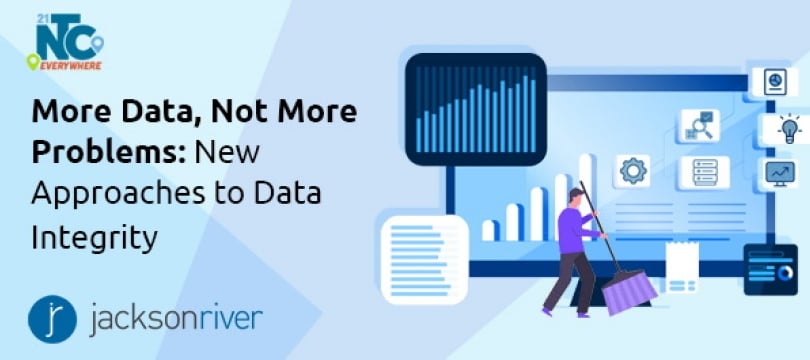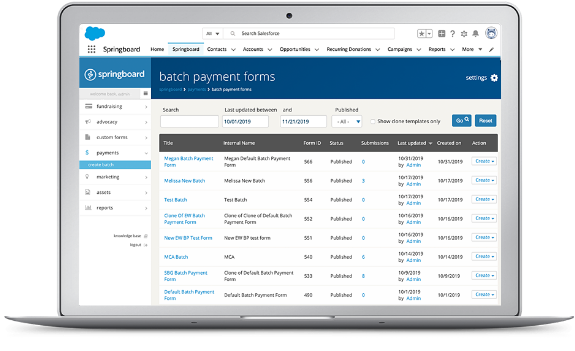#21 NTC: More Data, Not More Problems - Streamlining Data Migration to Support Personalized Fundraising

Data hygiene may not sound like an exciting topic, but quality of your data can make or break a successful fundraising program.
At this year's virtual NTC conference, our COO Jennie Corman spoke with a couple of our rockstar clients--American Jewish World Service (AJWS) and Open Doors USA (ODUSA)--about their success migrating their organizations’ data from multiple and sometimes siloed databases to Salesforce, with the goal of achieving a 360-degree view of supporters to more effectively communicate and engage with them.
We all know that a data migration project can be difficult and complex, involving many departments, decisions, and processes. But a question that keeps coming up again and again was “How do you deal with duplicates and messy data?”
Unfortunately, there is no easy answer, but there are many strategies to make it better.
AJWS and ODUSA began their migrations knowing that a lot of clean-up would be required before moving the data and immediately afterwards as well as an ongoing process. Both organizations worked with partners during the migration to migrate the data as cleanly as possible, but the actual implementations revealed new challenges and unforeseen issues that required new solutions and a bit of trial and error to make the process easier and more efficient over time.
Fortunately, one of the benefits of the Springboard and Salesforce solution is that organizations have substantial control of their data and a wide variety of places and options for evaluation, making decisions and executing plans to improve data hygiene.
Getting Good Data
One of ODUSA’s main drivers in the migration to Salesforce and Springboard was a strategic decision to focus on digital communications and introducing new tools to engage and communicate with supporters. And, those new tools and new touch points for engagement create new ways for messy data to enter the system. Rick from ODUSA sums it best: “People are endlessly creative in terms of how they fill in name and address data.”
Rachel from AJWS faced similar challenges: “I know Jackson River helped us a lot with sort of developing quality control measures, so for example, we mentioned we do advocacy work and people love to just put their city and state for petitions or NA (not applicable) for the address line, so you don't mail them, even though you already have their mailing address on record. So it really helped us to work through what kinds of data we'd accept without changes; what we'd accept and make slight changes through inline editing before they went live; and what we just did not want to accept.”
Front-end validation such as phone number and email validation and zip-code lookup for city and state have helped AJWS and ODUSA clean incoming data so that it’s easier to match and merge records when they sync to Salesforce.
Duplicate Matching: Automation vs Human
Springboard and Salesforce together deliver exceptional flexibility in both data collection and matching. Both ODUSA and AJWS use flexible contact matching in Springboard: instead of using email as the unique identifier when creating and matching contacts in Salesforce, Springboard uses Salesforce’s duplicate and matching rules to match users who enter through online forms with existing contacts and accounts in Salesforce.
Duplicate matching rules can be extremely flexible and powerful, but both organizations discovered that it's a balancing act that requires some trial and error. If your matching rules are too restrictive and require exact matches on name and address, a lot of new contacts are created unnecessarily. But if the rules are too relaxed or fuzzy, you may merge contacts that shouldn’t be merged and lose unique data. As with most of our clients using this tool, finding the right balance required some tweaking of the rules and lots of testing. Rachel from AJWS sums it up succinctly: “It can be hard to predict what the rules are and what is going to work.”
Rick from ODUSA adds: “You've just got to get your feet in it and you’ve got to feel out what’s working and what’s not working…but once you do the payoff is somewhat quick.”
Along with new systems and new rules, AJWS and ODUSA both constantly review their data and their cleanup process for ongoing improvement. Whether it’s setting up internal data management review processes, developing data review dashboards, using third-party tools like Apsona or developing in-house technologies, these organizations know the power of good data and are committed to delivering it.
The Payoff: Tailored and Targeted Fundraising
Although data hygiene efforts are ongoing, both AJWS and ODUSA are already seeing the benefits of their migrations and data improvement strategies including tailored and automatic communications.
According to Rachel from AJWS: “One of the biggest benefits of migration is to have a holistic view of the donors and be able to sue that for our communications through all of our channels. Understanding a donor’s interaction with fundraising and advocacy has also helped us with our high-touch programs for major gifts.”
At ODUSA, moving supporters through different levels of outreach is just one of the many ways the organization is leveraging data in their new system. Tony describes one of the new processes for re-engaging with recurring donors whose credit card data may have changed:
“When we have a recurring giver who gives monthly and their credit card expires, so the next payment gets declined, we currently kick off an automated Marketing Cloud journey to handle that. We send them an email to ask them to enter our portal and update their credit card information. If we don't get a response from this, we create a task where our mid-level-donor handlers can call the donor and prompt them to update their information and help them with that if they need to. It's just those kinds of processes we never could have accomplished on the old system.”
ODUSA is already planning to leverage their new data science team to find new and better ways to engage with supporters.
More high-quality data mean more insights to attract more supporters. Interested in how Springboard can help your team manage data and develop new insights for fundraising, advocacy and engagement? Let's talk!

